高中英语人教新课标选修六Unit 5 The power of nature-Reading 课件(25张PPT)
文档属性
| 名称 | 高中英语人教新课标选修六Unit 5 The power of nature-Reading 课件(25张PPT) |
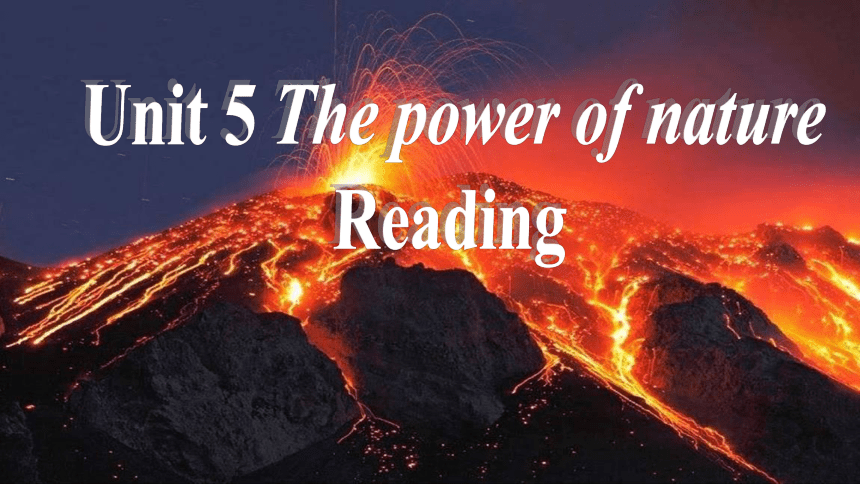
|
|
| 格式 | zip | ||
| 文件大小 | 4.1MB | ||
| 资源类型 | 教案 | ||
| 版本资源 | 人教版(新课程标准) | ||
| 科目 | 英语 | ||
| 更新时间 | 2021-12-28 08:43:08 | ||
图片预览

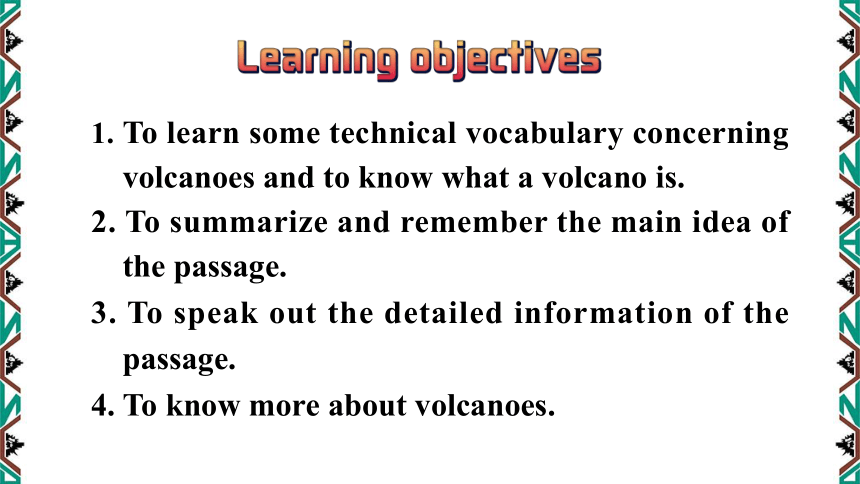
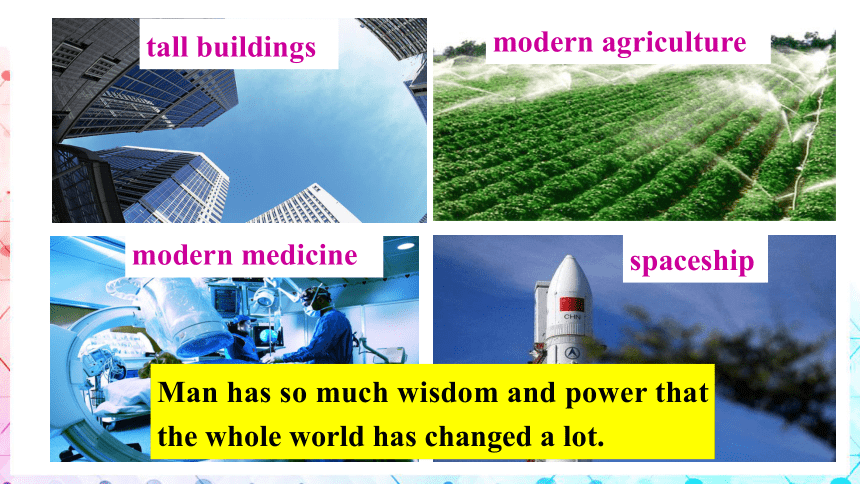
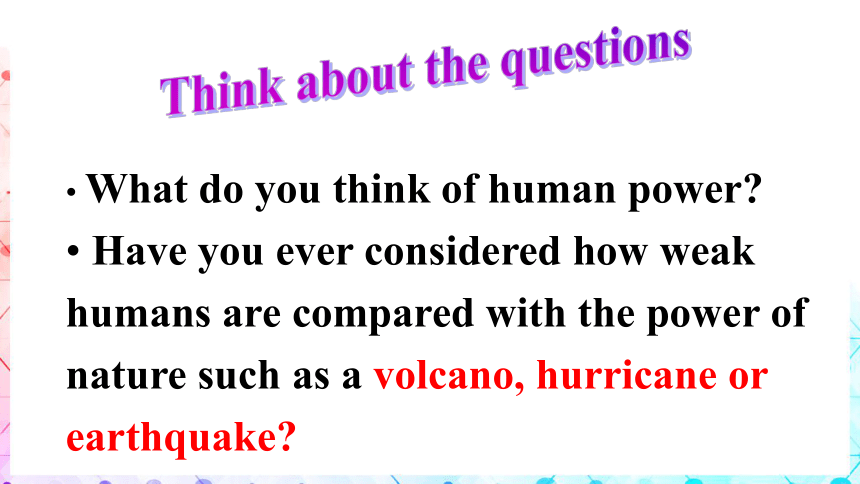
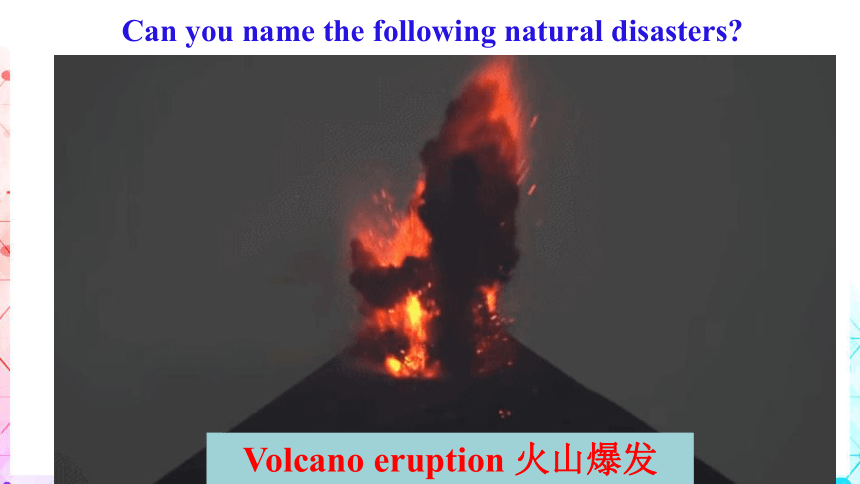
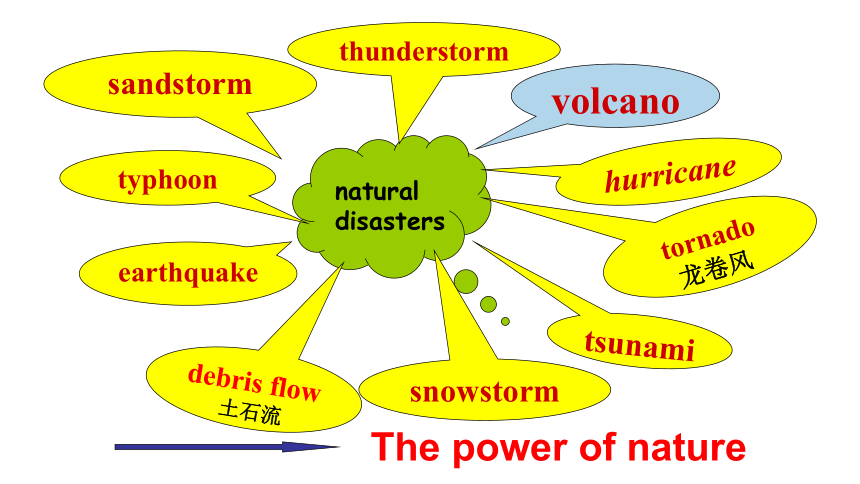

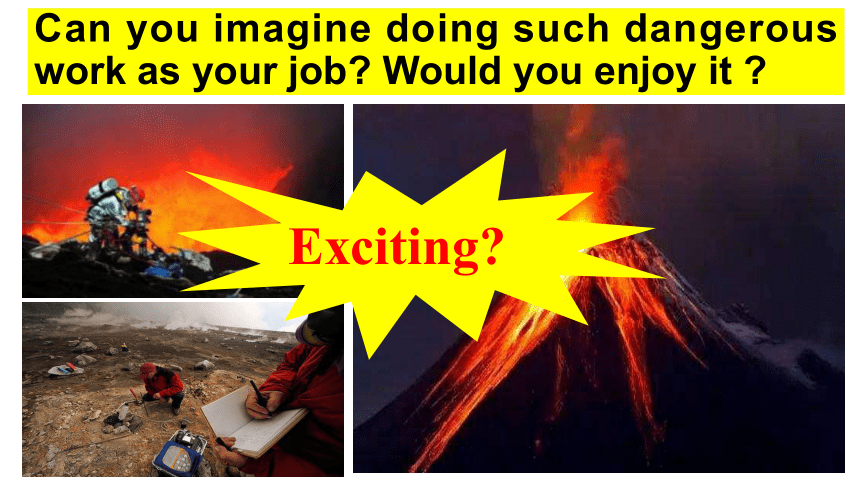
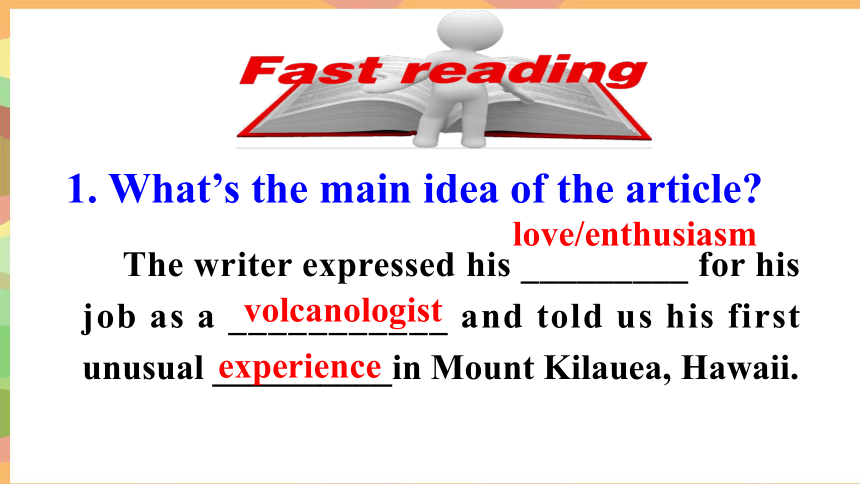
文档简介
(共25张PPT)
Unit 5 The power of nature
Reading
1. To learn some technical vocabulary concerning volcanoes and to know what a volcano is.
2. To summarize and remember the main idea of the passage.
3. To speak out the detailed information of the passage.
4. To know more about volcanoes.
tall buildings
modern agriculture
modern medicine
spaceship
Man has so much wisdom and power that the whole world has changed a lot.
What do you think of human power
Have you ever considered how weak
humans are compared with the power of
nature such as a volcano, hurricane or
earthquake
Think about the questions
Earthquake
Can you name the following natural disasters
Flood
Typhoon
Drought
Volcano eruption 火山爆发
natural disasters
sandstorm
typhoon
hurricane
tornado
龙卷风
earthquake
tsunami
debris flow土石流
snowstorm
thunderstorm
volcano
The power of nature
Boiling rock erupts from the crater(火山口); the lava (熔岩)
flows slowly down the mountain.
Look at the diagram below. What do you know about volcanoes Share your knowledge with your partner.
Can you imagine climbing into a live volcano in order to measure the temperature
Can you imagine doing such dangerous work as your job Would you enjoy it
Exciting
1. What’s the main idea of the article
The writer expressed his _________ for his job as a ___________ and told us his first unusual __________in Mount Kilauea, Hawaii.
love/enthusiasm
volcanologist
experience
2. Scanning: Find out main ideas for each part.
Part 1
(Para 1-2)
Part 2
(Para 3-4)
Part 3
(Para 5)
The writer’s ____ and its__________.
job
importance
The writer’s __________of watching the volcanic eruption.
experience
The _______ for the writer’s
_____________about his job.
reasons
enthusiasm
3. Careful reading (东方思维P59)
(1) Read the text again and fill in the blanks in the chart.
The writer's job Travel to unusual places and work 1.__________people from all over the world.
Help protect ordinary people from the 2.____________
Collect information for a 3._______________
about Mount Kilauea; help other scientists to 4.________ where lava will flow next and how fast.
alongside
volcano
datebase
predict
The first experi-ence The day of the 5.______ My bed began 6._________and I heard a strange sound.
My bedroom became as 7._________as day.
Red hot lava 8.________hundreds of metres into the air.
The day after the eruption Two other scientists and I were driven up the mountain and dropped as close as possible to the 9._________that had been formed during the eruption.
We slowly 10._________to the edge of the crater and looked down into the red, boiling centre.
3. Careful reading (东方思维P59)
(1) Read the text again and fill in the blanks in the chart.
eruption
shaking
bright
was fountaining
crater
made our way
Deep comprehending
1. What does the writer mean by using“lucky” in the sentence“I was lucky enough to have a much closer look at it"
A. He felt much safer on the top while the other two scientists climbed down into the crater.
B. It was his first sight of an eruption.
C. It was the first time for him to watch the crater.
D. Both B and C.
词义猜测题
2. What did the author do after he was appointed as a volcanologist
A. He collected information about Mount Kilauea on thespot.
B. He analyzed the data and predicted where the lavawould flow.
C. He persuaded people to move their homes out of thepath of the lava.
D. He saved people who were covered with lava.
细节理解题
3. Which of the following descriptions of an eruption is NOT correct
A. It causes great damage near the top of Mount Kilauea.
B. The places where the lava flows are usually seriously damaged.
C. It can be seen from a distance, even in a house garden.
D. The lava can fountain hundreds of metres.
细节理解题
4. What did the writer feel and see in his first sight of an eruption
A. His bed began shaking and he heard a strange sound.
B. His bedroom was as bright as day.
C. Red hot lava was fountaining hundreds of metres into the sky.
D. All of the above.
推理判断题
5. What is the main idea of the passage
A. An eruption occurred in Hawaii.
B. A volcanologist's job is exciting.
C. A volcanologist's exciting job and his first sight of an eruption.
D. A sight of an eruption is horrible.
主旨大意题
Why does the writer say that he has the greatest job in the world
The greatest job
2. Why is a volcanologist’s job important
Volcanologists study volcanoes so that they can warn people when the volcano is going to erupt and save many lives.
My job is studying volcanoes for the Hawaiian Volcano Observatory (HVO). I collect information about Mount Kilauea, one of Hawaii's active 1. ________ (volcano). This information helps predict 2. ________ lava from the volcano will go next. People's lives can then 3. ________ (save) by warning them to leave their houses before the lava 4. ________ (come). The volcanic 5. ________ (erupt) don't cause much damage as no one lives near the top. The lava 6. ________ (flow) down the mountain causes far
Fill in the blanks according to the text.
volcanoes
where
be saved
comes
eruptions
flowing
more damage 7. ________ it buries everything in its path. I will never forget the first time I saw a fountain of red hot lava bursting out of Mount Kilauea. It was a fantastic sight. The next day two scientists and I wore special clothing 8. ________ (protect) us while we took a closer look at its crater. Twenty years later I am still 9. ________ (excite) about my job. I am amazed by the beauty and 10. ________ (danger) power of volcanoes.
because
to protect
excited
dangerous
Q1:Why does the author use “exciting” to describe his job as a volcanologist Give your reasons. Give your reasons.
He can see the fantastic sight of volcanic eruption.
(The fantastic sight of volcanic eruption excites him.)
The occasional danger of his job excites him and makes him
feel alive.
He can help protect ordinary people from the harm of
volcanoes. (The importance of his work excites him.)
adventurous
(Although my job is occasionally dangerous, I don't mind because danger excites me.);
sympathetic
(However, the most important thing about my job is that I help protect ordinary people from one of the most powerful forces on earth--the volcano);
professional
(collect and evaluate information; quick-reacted after the eruption and proper dressed in the research on the spot; have studied for many years);
cautious/cooperative
(This being my first experience, I stayed at the top and watched them);
enthusiastic
(Today, I am just as enthusiastic about my job as the day I first started).
Q2: Do you think whether the author is a qualified volcanologist or not (answer with evidence from the text)
Try to write a short composition about the reason why you want to become a volcanologist or not.
Homework
Unit 5 The power of nature
Reading
1. To learn some technical vocabulary concerning volcanoes and to know what a volcano is.
2. To summarize and remember the main idea of the passage.
3. To speak out the detailed information of the passage.
4. To know more about volcanoes.
tall buildings
modern agriculture
modern medicine
spaceship
Man has so much wisdom and power that the whole world has changed a lot.
What do you think of human power
Have you ever considered how weak
humans are compared with the power of
nature such as a volcano, hurricane or
earthquake
Think about the questions
Earthquake
Can you name the following natural disasters
Flood
Typhoon
Drought
Volcano eruption 火山爆发
natural disasters
sandstorm
typhoon
hurricane
tornado
龙卷风
earthquake
tsunami
debris flow土石流
snowstorm
thunderstorm
volcano
The power of nature
Boiling rock erupts from the crater(火山口); the lava (熔岩)
flows slowly down the mountain.
Look at the diagram below. What do you know about volcanoes Share your knowledge with your partner.
Can you imagine climbing into a live volcano in order to measure the temperature
Can you imagine doing such dangerous work as your job Would you enjoy it
Exciting
1. What’s the main idea of the article
The writer expressed his _________ for his job as a ___________ and told us his first unusual __________in Mount Kilauea, Hawaii.
love/enthusiasm
volcanologist
experience
2. Scanning: Find out main ideas for each part.
Part 1
(Para 1-2)
Part 2
(Para 3-4)
Part 3
(Para 5)
The writer’s ____ and its__________.
job
importance
The writer’s __________of watching the volcanic eruption.
experience
The _______ for the writer’s
_____________about his job.
reasons
enthusiasm
3. Careful reading (东方思维P59)
(1) Read the text again and fill in the blanks in the chart.
The writer's job Travel to unusual places and work 1.__________people from all over the world.
Help protect ordinary people from the 2.____________
Collect information for a 3._______________
about Mount Kilauea; help other scientists to 4.________ where lava will flow next and how fast.
alongside
volcano
datebase
predict
The first experi-ence The day of the 5.______ My bed began 6._________and I heard a strange sound.
My bedroom became as 7._________as day.
Red hot lava 8.________hundreds of metres into the air.
The day after the eruption Two other scientists and I were driven up the mountain and dropped as close as possible to the 9._________that had been formed during the eruption.
We slowly 10._________to the edge of the crater and looked down into the red, boiling centre.
3. Careful reading (东方思维P59)
(1) Read the text again and fill in the blanks in the chart.
eruption
shaking
bright
was fountaining
crater
made our way
Deep comprehending
1. What does the writer mean by using“lucky” in the sentence“I was lucky enough to have a much closer look at it"
A. He felt much safer on the top while the other two scientists climbed down into the crater.
B. It was his first sight of an eruption.
C. It was the first time for him to watch the crater.
D. Both B and C.
词义猜测题
2. What did the author do after he was appointed as a volcanologist
A. He collected information about Mount Kilauea on thespot.
B. He analyzed the data and predicted where the lavawould flow.
C. He persuaded people to move their homes out of thepath of the lava.
D. He saved people who were covered with lava.
细节理解题
3. Which of the following descriptions of an eruption is NOT correct
A. It causes great damage near the top of Mount Kilauea.
B. The places where the lava flows are usually seriously damaged.
C. It can be seen from a distance, even in a house garden.
D. The lava can fountain hundreds of metres.
细节理解题
4. What did the writer feel and see in his first sight of an eruption
A. His bed began shaking and he heard a strange sound.
B. His bedroom was as bright as day.
C. Red hot lava was fountaining hundreds of metres into the sky.
D. All of the above.
推理判断题
5. What is the main idea of the passage
A. An eruption occurred in Hawaii.
B. A volcanologist's job is exciting.
C. A volcanologist's exciting job and his first sight of an eruption.
D. A sight of an eruption is horrible.
主旨大意题
Why does the writer say that he has the greatest job in the world
The greatest job
2. Why is a volcanologist’s job important
Volcanologists study volcanoes so that they can warn people when the volcano is going to erupt and save many lives.
My job is studying volcanoes for the Hawaiian Volcano Observatory (HVO). I collect information about Mount Kilauea, one of Hawaii's active 1. ________ (volcano). This information helps predict 2. ________ lava from the volcano will go next. People's lives can then 3. ________ (save) by warning them to leave their houses before the lava 4. ________ (come). The volcanic 5. ________ (erupt) don't cause much damage as no one lives near the top. The lava 6. ________ (flow) down the mountain causes far
Fill in the blanks according to the text.
volcanoes
where
be saved
comes
eruptions
flowing
more damage 7. ________ it buries everything in its path. I will never forget the first time I saw a fountain of red hot lava bursting out of Mount Kilauea. It was a fantastic sight. The next day two scientists and I wore special clothing 8. ________ (protect) us while we took a closer look at its crater. Twenty years later I am still 9. ________ (excite) about my job. I am amazed by the beauty and 10. ________ (danger) power of volcanoes.
because
to protect
excited
dangerous
Q1:Why does the author use “exciting” to describe his job as a volcanologist Give your reasons. Give your reasons.
He can see the fantastic sight of volcanic eruption.
(The fantastic sight of volcanic eruption excites him.)
The occasional danger of his job excites him and makes him
feel alive.
He can help protect ordinary people from the harm of
volcanoes. (The importance of his work excites him.)
adventurous
(Although my job is occasionally dangerous, I don't mind because danger excites me.);
sympathetic
(However, the most important thing about my job is that I help protect ordinary people from one of the most powerful forces on earth--the volcano);
professional
(collect and evaluate information; quick-reacted after the eruption and proper dressed in the research on the spot; have studied for many years);
cautious/cooperative
(This being my first experience, I stayed at the top and watched them);
enthusiastic
(Today, I am just as enthusiastic about my job as the day I first started).
Q2: Do you think whether the author is a qualified volcanologist or not (answer with evidence from the text)
Try to write a short composition about the reason why you want to become a volcanologist or not.
Homework
